4
Marcelo Rios: The Man We Barely Knew
15 Comments · Posted by Scoop Malinowski in Articles, Scoop
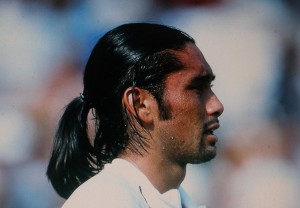
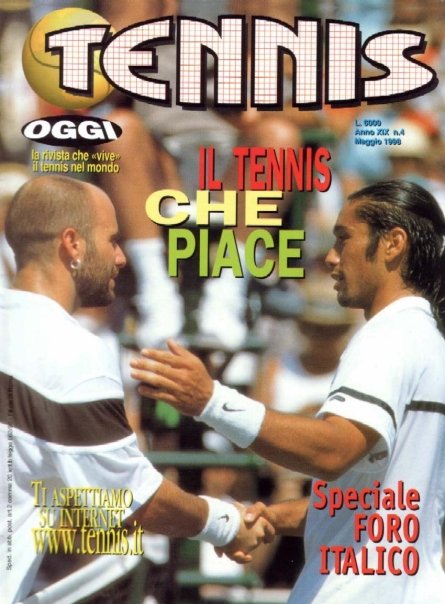
(This article was originally published in Tennis Week magazine in March of 2005 and at www.tennisweek.com on 03/22/2005.)
By Scoop Malinowski
“Be not afraid of greatness: some are born great, some achieve greatness and some have greatness thrust upon them.” — Shakespeare.
“There is no great genius without some touch of madness.” — Seneca.
No tennis player ever awed us with his beautiful talents quite like Marcelo Rios. Even his name flowed smoothly, like that of some legendary artist from centuries ago.
The great Rios turned pro in 1994 and went on to win 18 career singles titles, including five Masters Series. He produced his finest season in 1998, capturing three consecutive Masters Series titles (Indian Wells, Key Biscayne and Rome) along with four other titles. Rios even became No. 1 at the age of 22 for six weeks after conquering Andre Agassi in a captivating performance on Key Biscayne to become the first South American to rise to the top of the ATP rankings.
But for how familiar we were with the Rios style on the court – that leaping two-handed backhand, the graceful and artful movements, those uncanny angles, the Chilean chanting from his flag-waving supporters – there was always an aura of mystery about Rios. Why did he seem so often to be joyless on the court? For what reasons was he so reluctant to do media interviews or engage with the fans or even other players? Was his reputation for being unapproachable an act of self-defense because he was actually very shy?
The enigma of Rios will continue to confound us now that he retired (due to repeated leg and back injuries) last summer from professional tennis at the age of 28. His last ATP matches were in April of 2004, losses in Satellite events in Ecuador and Mexico City to Mariano Delfino and Juan Pablo Guzman. Suddenly the career of Rios was over, without any final applause or a befitting tribute.
Even the idea for this article only came by a chance comment during an unrelated interview with former Australian Open winner Thomas Johansson. The Swede just so happened to share this anecdote of Rios when I asked him for a funny tennis memory, something from tennis that made him laugh:
“All the guys have different humors, outside of the court,” Johansson said. “A player that I really liked to watch was Rios. I think he was one of the best players, ever. Because I remember one year when he was gonna play Thomas Muster in Rome. And I saw the press conference before the match. And they asked him, so how are you gonna be able to beat Muster, because he only had lost one or two matches on clay so far. And Rios said, ‘The guy should be happy if he gets like a couple of games.’ And Rios went out there the next day and killed him, 1 and 2. And that’s for me unbelievable. I really liked to watch him. I didn’t like to play him though. But I really liked to watch him.”
Asked why he didn’t enjoy the experience of playing Rios, Johansson replied: “He could make you feel like it was the first time you were standing on a tennis court, you know [smiling]? So I hated to play him. You could get killed by him easily, 1 and 1 or something like that, and you could have played a good match.”
Johansson’s high regard for Rios sparked a curiosity to investigate further insights about Rios from others in the tennis community. If a Grand Slam champion like Thomas Johansson had such respect for Rios, just what else would some of the other ATP insiders have to say?
So here’s an interesting and insightful collection of memories and lasting images of one of the great tennis players of this modern era, Marcelo Rios:
Jimmy Arias, former No. 4 in the world: “My one memory of Marcelo Rios is I was retired for a number of years already and he was ranked No. 2 in the world in 1998. And he lost first round of Wimbledon. And made some disparaging remarks about Wimbledon. He came to Bollettieri’s because he had to practice for the rest of the summer. And I was the only one there. Everyone else that played was still at Wimbledon. So I was a decent enough player for him to practice with. So Nick called, ‘Can you come? Marcelo Rios is here for a couple of weeks?’ So we play the first day, the first set…and he’s not trying at all [smiles]. He’s just sort of lounging around. And I win the set 6-4. And as is my way, when I play a top guy of today, I find a way to give them a little jab, just to see how they react. So we finish the set and as we’re shaking hands after, I said, ‘Marcelo, what would you rank me if I were playing today? Two or three in the world?’ And he said, ‘Man, tomorrow, I’m going to kick your ass!’ And I liked his attitude. And actually, some of the top players, when I give them a hard time, they actually didn’t want to play with me anymore. When I would say something like that, they would get insulted. They didn’t want to play with me. Rios came at me. He said, No, I’m gonna kick your ass tomorrow. And sure enough, we came back the next day, and for about three games, he was fired up. And I was playing well and was down 3-love. And he couldn’t keep that intensity, because it’s practice. He’s just so relaxed. Eventually the set was close. But I did see for those three games what talent he had. He would hit a couple of forehands in a rally, and with that same swing, not a bigger backswing, nothing, he’d suddenly hit it 20 miles-per-hour harder. Down the line for a winner. You didn’t know how that happened. You couldn’t understand how the same swing produced such a different pace on the ball. So that’s part of what he had that the other players couldn’t figure out.”
Hernan Gumy, former top 50 ATP player from Argentina: “I have a personal memory about him because we were kind of close. He didn’t get along with many players. But we were kind of friends in a way. And we play against each other many times. The greatness of his game, I didn’t see anybody who play like him in the past 10 years. All the most difficult things he made it easy. I mean, it was so nice to watch him play. It would have been great to have him for a couple of more years. He’s still young but, every time I spoke with him, he said that he was not made to travel 25 weeks a year. Or play 20 tournaments. He loved to play the big tournaments but he didn’t like the whole life of a tennis player. So you have to understand that also. But I think he was a great. He was a nice guy from, I repeat, my side. And he was a helluva tennis player…The fans and the media never got to (know) him really close. I think you have to check the background. In Chile, when he was a kid, he had some problems with the media when he was 16. When he stepped up to complain about something about the Federation. So maybe after that he took some distance from the media around the world. With the fans also. Like I said, he was gifted to play tennis. But he was maybe not gifted to do whatever is outside to the inside of the tennis court. Because he loved to practice, sacrifice. He loved to compete. But everything else outside of the tennis, you name it, the fans, the kids, he wasn’t able to do it. Because of his character, he didn’t enjoy to do that. He’s a guy who, I believe, he do things that he enjoy…We were close. I mean, he was a sensitive guy. Personally, he was a guy that I really liked. I know that not many players like him, but I like him.”
Luis Lobo, former coach: “I just have good things to talk about Marcelo. I think he was the most professional player that I’ve ever seen. I know the people think of him another way, but for me he was a very good professional. He was one of the best players in the world, for sure. For sure he’s one of the best players in history. For me, yes. Because, about tennis, if he made a Grand Slam or No. 1 for more time, for sure he’s one of the best guys I ever see. Very talented. If you play against him on a day when he’s focused, very tough to beat him, very tough. He had so many great matches, Monte Carlo against Kuerten, Paris against Albert Costa, indoors when he make Singapore, so many good matches. (What held him back from winning a Slam?) It’s a good question, I don’t know. I’m not a psychologist [laughs]. He was very close to winning a Grand Slam. He lost the final (in Australian Open to Korda in ’98), and then personal problems. I don’t know. One part of each player, some players when they’re this close to the final, they make it. And others, no, they can’t do it. But I think he was injured a long time too. And the moment for him was a stress fracture in the lower back, and problems with legs…He was very nice person. Very nice. When he was in a tournament, he would be alone and no say hello to anybody. Just a few guys. He didn’t believe too much in the people. And I think he was right. Because in tennis, the world is very tough to be friends.”
Fabrice Santoro: “I played Marcelo three times. You could say, on the court, he was a great, great player. And one of the greats of the game. He was to serve well and he hit the ball really, really well on both sides. He hit the backhand moving well too. I remember when he won Indian Wells and Key Biscayne in a row, he was playing one of the best tennis I’ve ever seen…We played three times, he beat me twice. It was always a good match. Because I like to use the spins and slice on the court and when I was playing against him, it was a very fun match, but it was a very good competition. His talents  one of the best. A lefty Agassi. (What was he missing?) Sometimes a little bit short physically. Because other guys can serve really well. He can play well forehands, backhands, moves pretty well. But five sets for two weeks, too tough for him.”
Wayne Ferreira: “He was really good because he took the ball early and he had a lot of feel on the ball. He moved pretty well and he was a good competitor. But he was so good at finding where the ball was going and taking it so early…I didn’t really have a problem with him. I actually did pretty well against him. I beat him most of the times that I played against him. I just felt like I could overpower him a lot. He got a lot of balls back and he took it early but, to me, he was a little bit soft at times. He didn’t hit the ball that hard. I felt like he hit the ball, I could still run down everything. I could overpower him. But he was difficult. He could get a lot of balls back, make you play a lot of balls. I had to be in great shape and I had to be really competitive and concentrate a lot to beat him. (Why did he not win a Slam?) Maybe for that reason. I think he was just a little bit soft. Guys like Pete and Andre, on a regular basis, when it got tight, tough like this, they used to overpower him.”
Roger Federer: (When asked back in 2000 which was his favorite tennis player to watch): “I like Rios. I like his game. When he’s playing well, he’s fun to watch. Because he’s a different type of guy.”
Vera Zvonareva: “I think Rios was a great tennis player. I watched him play maybe a year and a half ago in Washington. And I think he was a great player to watch for me. I think he was like an actor on the court. And I love it because he was doing his show. Everybody knows it’s tough to play tennis, especially when it’s 100 degree. And he was like performing like an actor. You can always see his emotions. He wasn’t just like standing there doing his job, you could see how he feels.”
Patrick McEnroe (his ESPN commentary during the first set of the 2002 Nasdaq- 100 semifinals vs. Agassi): “I’m not even sure if he goes out there with a strategy, Cliff. He just goes out there and just swings away, angles the ball, it looks like he just sort of free-wheels it out there and relies on his talent. Agassi used to do that. Agassi would just bomb the ball and just says, I’m just gonna be a shotmaker and I’m gonna rely on that. But why Agassi has won seven Slams now and Rios has won zero is because Agassi has learned to play his opponents, to play within himself, to come out there focused, to be physically fit, to have a strategy, have a gameplan…The players are just too good these days, to think you can go out there and just free-wheel it…That is SCARY right there! That is pure genius right there. What a one-two from Rios. Just launching himself into that backhand, taking it in mid-flight for the clean winner cross court (at 7-7 in the first-set tiebreak – which Rios won 9-7, but he retired after losing the second set 6-4.).”
Guillermo Vilas: “I talked to him a couple of times. He didn’t talk too much. He had a strong character. It’s like when you are in front of a lion – you are not going give some candy to a lion, right? Everybody knew he was like that. Some people are like that. If you give him enough space, he’s okay…He play well, but he could never win something very big. He had the qualities to do that, then his body gave out. But he left his image to the players – a very good way of playing and the attitude was like a rebel. He was very interesting, to add color to the game. If he wouldn’t have had all those injuries, he would have been better, much better. The time he was there, he was exciting. But it’s sad, because the body gave out. He was a great player, but you have to be champion of the world. He was geared to do that, but the body didn’t allow him to do that. Like it happened to Muster. Muster was gearing to be No. 1. Suddenly he had the accident (hit by car in Miami) and three years after, he did it. Rios didn’t have that second chance. You can say Rios was one of the most gifted ever. But not one of the best ever. Because you have to win something, you have to do a little bit more. He looked very nice, everything he did. But the body did not allow him to do it.”
Ilie Nastase: “He’s the worst prick I ever met. The players of today probably have the same opinion of him. Ask all the players what they think of him, you’ll get the same thing. When somebody doesn’t sign autographs for the kids, that is a prick for me. (What about his game?) I don’t give a shit. I don’t look at him. For me, he’s an idiot. I don’t know what else to tell about him. And that’s the first time I say something about somebody like that. I think he was the worst thing for tennis. He did not deserve to be No. 1, one or two days. To live with the other players like he did… terrible. He really was the worst. I never say anything about anybody else like this but about him I have to say this. Sorry.”
Pat Cash: “Rios is one of the most talented players I’ve ever seen. I thought he had a control like a McEnroe. He was definitely a wasted talent but he still got to number one in the world. I loved watching him. He was brilliant. He hit the ball anywhere. Anywhere…I played doubles with him one week, in Scottsdale in ’95 or ’96. When I was making a comeback. We practiced quite a bit. And when I practiced with him, I never ran so much in my life. I played with a lot of the top guys in practice and he was just able to hit the ball anywhere. He used to run me everywhere. (How did you do in doubles with Rios?) Not very good. It wasn’t his fault though [smiles]. I was making a bit of a comeback and I was pretty terrible. But he was a brilliant player and I was disappointed that he never actually fulfilled his potential. (Get along well with him?) I got on all right with him. A lot of other guys didn’t like him, that’s for sure. Not many guys, I think, got along with him. And he was fine to me. We always had a good time, we practiced hard and I liked his game. And I think he appreciated somebody that was nice to him, I think.”
Melchior DiGiacomo, noted tennis photographer: “I think he’s one of the best players I’ve ever seen play the game. I’ve been following tennis since 1971. And I thought Rios was a bit of a throwback in many ways. He reminded me of guys like Ken Rosewall, who had so many great shots. Guys like Tom Okker who was a brilliant player. Rios was that way. But I couldn’t figure Rios’ head. Because I never knew where he was on the court. Whereas the older players, you always knew where their head was, their head was, To win. At all costs. But Rios, I don’t know. There’s a wonderful line written by Norman Mailer in a book called ‘The Bullfighter.’ He’s talking about how a man cannot be judged by what he is, the man is best judged at his greatest moment. (Melchior sent the exact quote to me the next day: “The one thing that can keep the sweet nerve of life alive is the knowledge that a man cannot be judged by what he is every day, but only at his greatest moment, for that is when he shows what he was intended to be..It is a Latin approach, their allegiance is to the genius of blood. So they judge a man by what he is at his best.”) And that’s what Rios was to me. There are times when you look at him and you say, Nobody in the world has ever done what he has just done, in terms of the match. And then you may see him the next day or two days later and you go, What happened to that guy that was out here a couple of days ago? Is it the same guy? I don’t know how you get to a kid like that. Again, he was brilliant. There were other players who were like that, Mel Purcell never had a killer shot. But you had to hit him over the head with a shovel if you wanted to beat him. But Rios’ head was the thing. He had every shot in the game. There was nothing he couldn’t do. (How was he as a subject to shoot?) Brilliant. Because of his athleticism. He wasn’t like Adriano Panatta, who was like this stand-up, at-attention Italian. He had a beautiful game but there really wasn’t anything to shoot, in terms of physical action. Rios is the kind of guy that could stop on a dime and give you five cents change. He was very exciting to shoot. Connors was not very exciting to shoot, in the sense that he played basically a baseline game, rarely came to the net. And the only time Jimmy was exciting was when he pumped up the crowd. Then he was exciting. But photographing Rios during a match was always exciting. And you had to be quick, because he was quick. When guys are running as fast as he is and lunging out making shots, that’s exciting for me, because he fills the frame. He’s not standing up straight. But Rios was exciting. And he’ll be missed. By me. I don’t know about everybody else.”
Carl Munnerlyn, former U.S. Open locker room supervisor: “Rios was very giving. When I knew him, when he was a player, he always, after each practice, he would come in and go up to one of the attendants and always offer a pair of his shoes that he just practiced in. And even after the match. His match shoe, that he wore in the match. He’d always come up to us and give us his shoes. Every time, every day he was here. It was unbelievable how such a giving person he was. Not too many people knew him that way, but we, as locker room attendants, knew him that way, as a very giving, courteous person. And he always joked with us, he liked to joke with us. Because he saw us as people he could relate to. He was relaxed with us. And we brought out his lighter side, his personality, instead of serious all the time, like always getting ready for a match. One time I was standing next to the soda refrigerator and he walked by and gave my head a push. I turned around and Marcelo’s walking out the door, smiling. So that’s how I know him. He was friendly to me. In that sense, I know him that way. He was never not the slightest bit sarcastic to me. That’s what I know of Marcelo Rios. Nice guy.”
Marat Safin: “Rios had the talent to win ten grand slams.”
Petr Korda: “I beat him badly (in 1998 Australian Open final 6-2, 6-2, 6-2). It was very, actually I had the chance to see the match on video for the first time a month and a half ago. And in TV it looked completely different than it did on the court. But I remember I was really dominating and I was ready for that. I knew this was probably my last chance to win a Slam and if I played the right game, then I could beat him. I think I really shot him down that day. I know we were hitting the balls very hard. On the TV it doesn’t look like it. I was hitting balls very hard. (What kind of person was Rios?) I think that not many people knew him. Some people had problems with him, he was like a controversial, not many people did like him. But I know him, we play doubles. I don’t know if it was before or after we played in Australian Open. He was a nice guy. Gifted player. And I said in Australia, he can be maybe number one. But it’s most important to win the Slam. Unfortunately for him, he never achieved it. Maybe I was that reason, probably.”
Jaime Fillol, former Chilean pro tennis player with six career singles titles, quarterfinalist 1975 U.S. Open: “I first met him in New York when he was a junior. And he was already playing well in Futures. We became very close. We run an ATP event in Chile. We would have to many times negotiate with him, his participation, especially when he was top 10. I think he was a very good player, he had a lot of talent. Not just with his hands, but with his mind. Very good at feeling no pressure and I think that’s what made him so good. There’s a lot of people that have talent but when it comes to winning, they have a hard time winning. And he was winning a lot of matches at a young age. Then I think he got hurt too much, too often, he couldn’t keep it up. There was criticism over his attitude, that he wouldn’t fight hard enough. But I would say that his personality was not a disciplined mentality. He was very erratic in that respect. He was not a Saxon or a Slavic, he’s Chilean, he’s kind of moody. And if he doesn’t feel good, he just doesn’t try. Not because he’s lazy, because he doesn’t feel good. So I think that was the criticism, which was fair, in order to be a champion and stay there as champion, you have to have the discipline too. Have the discipline, as far as to be a champion.”
Asked for his lasting image of Rios, Fillol replied: “Playing so well that it was so much fun to watch him play. In fact, he really could make almost anyone look like a beginner. If things were right, he would guess exactly where the ball was coming. He would anticipate. He didn’t have to be strong physically to make the ball go and to have the guy run from one side to the other. I think his body didn’t hold the pressure of the circuit. He was weak in his preparation, probably coming from Chile, not knowing exactly what was gonna happen if he was that good. I don’t think he was prepared physically for the Tour. (Did he ever win the Chile event?) He never won the tournament, that’s why I didn’t mention it [smiles]. He got to the finals four times. He would make the crowd very upset because everybody was waiting for him to win the first time. He made the finals four times and lost to guys he should have beat, Slava Dosedel, Hernan Gumy and recently he lost in 2002 to David Sanchez (also to Julian Alonso). He was winning 6-1 and 40-love to go up 4-1 and lost the game. And then he couldn’t play. He became nervous.”
“He was very, the word in is Spanish, ‘contradictorio’, he would do the unexpected. If you were waiting for him to say hello to you, he’s not gonna say hello to you. If you didn’t think he’d say hello to you, he’d come up and say hello to you. He treated people like that. Not that he didn’t care for people, it was just like a game. He made a lot of enemies because of that, but I don’t think he’s a bad person. I would say he didn’t have the same discipline you need to have off the court. Many times he would do things, I mean the President of Chile was practically disgraced by him. When he became number one and the President invited him to the Palace and he came in a shirt, looking like he was going to the beach. And the President said, ‘Marcelo would you like to say something to the people?’ No, I don’t want to say anything.’ So he turned the President of the country off just by being different. He didn’t think it was a big occasion, but he’s not a bad person.
“I saw him about two months ago in Santiago, at the gym where he was training. I was talking to his physical trainer. And Marcelo was there, although he is retired, he still goes to the gym every day and trains, so he’s in good shape, other than the pain that he says he feels when he plays tennis.”
* * * * *
“A man of genius makes no mistakes. His errors are volitional and are the portals of discovery.” — James Joyce, Ulysses
“We don’t see things as they are, we see things as we are.” — Anais Nin
“To be great is to be misunderstood.” — Ralph Waldo Emerson
You can buy the book “Marcelo Rios: The Man We Barely Knew” at amazon books for $12.99.https://www.amazon.com/Marcelo-Rios-Man-Barely-Knew/dp/1461162416
ATP · Chile · Guillermo Vilas · Ilie Nastase · Marat Safin · Marcelo Rios · Miami Open · Roger Federer

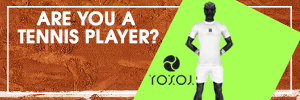

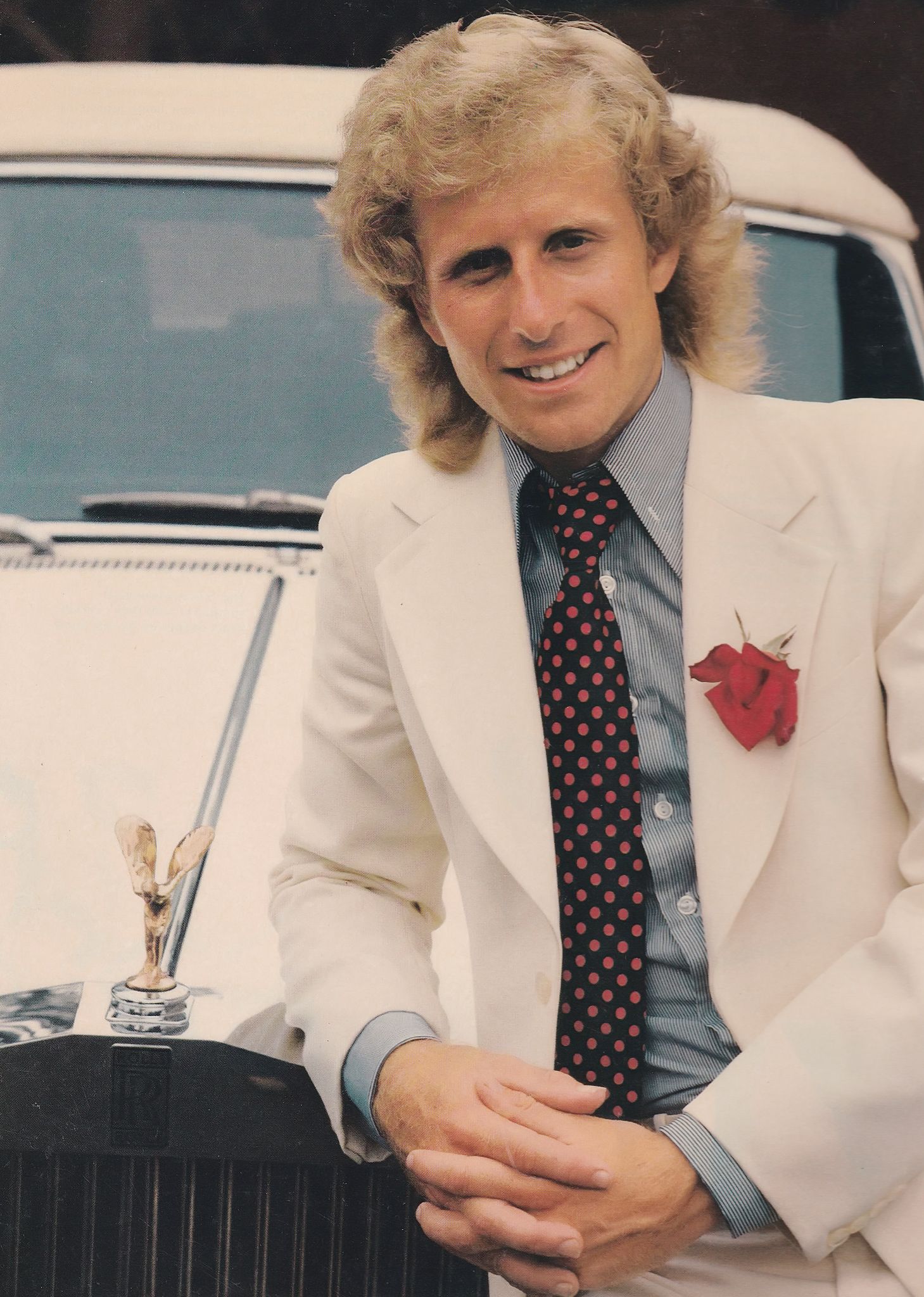
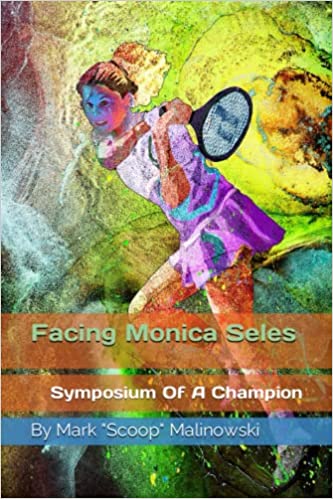
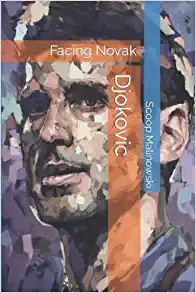
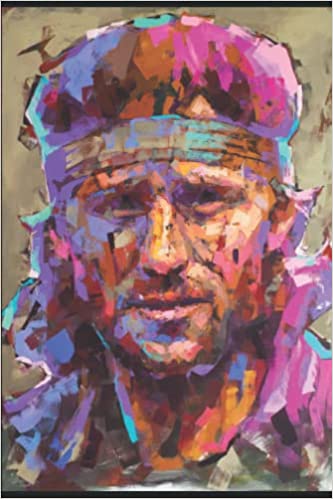
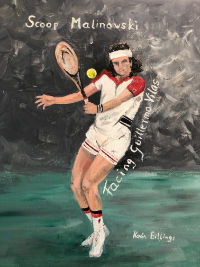
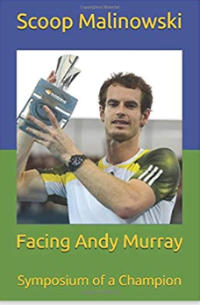
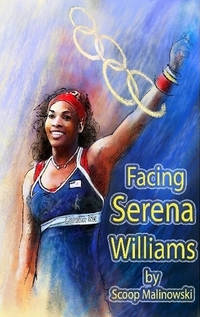
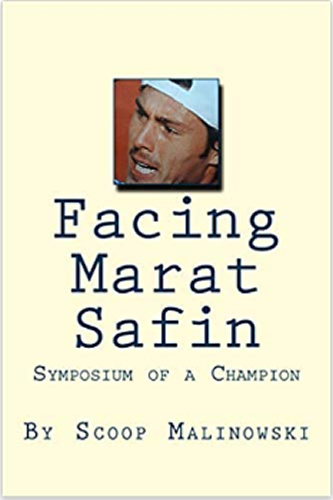
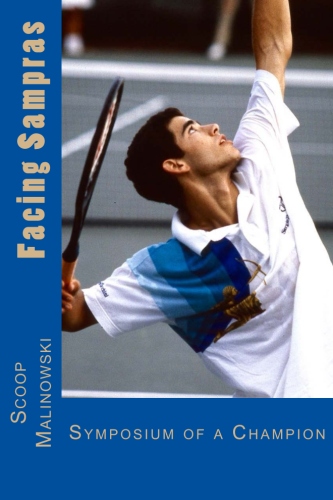
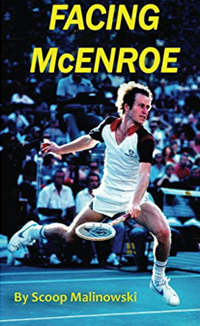
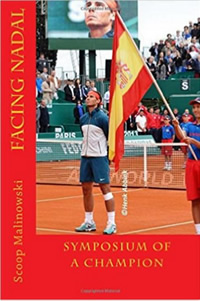
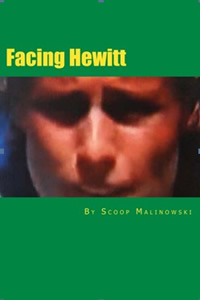
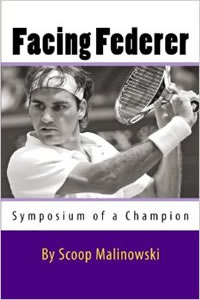
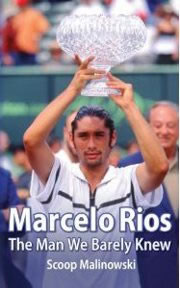

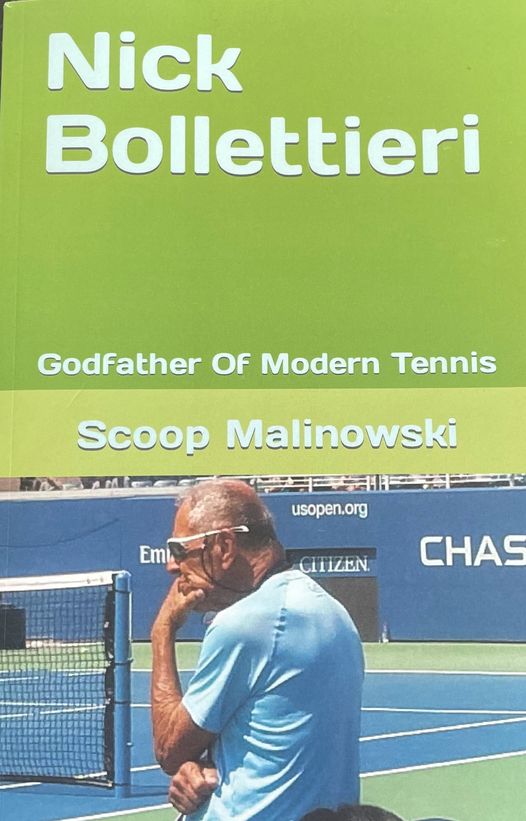
![McEnroeRios[1]](https://www.tennis-prose.com/wp-content/uploads/2010/09/McEnroeRios11.jpg)

Andrew Miller · September 5, 2010 at 10:40 pm
I owe Scoop a memory from 2001, the Legg Mason Classic tournament in Washington DC. I attended the qualifier round and practice sessions the Saturday and Sunday before the tournament in Rock Creek Park, which straddles the DC and Maryland borders and serves as an oasis of sorts from much of political scene, and concrete, that marks much of DC. After seeing some players hit around – among them a cursing Alex Corretja and a cursing Justin Gimelstob (who mangled a racquet during his practice session), as well as the ubiquitous Bryan brothers – ubiquitous because they seem everywhere at once, I had the privilege of seeing Marcelo Rios practice against Ramon Delgado, of Paraguay, who I remember because a fellow fan in the stands said, “he’s different from the other Delgado on tour – Jamie, who’s from the U.K.”. Marcelo Rios needed no such distinction: apart from the pony tail, his style of play separated him from anyone on the planet that day. He simply hit the tennis ball to parts of the tennis court that his opponent did not know existed. I have never seen a player with as much grace or knowledge of the sport – in terms of how it CAN be played – exploit opportunities on the tennis court like Rios did. For a player his diminutive size, his hit his serve as hard as someone 6 foot 5, somewhere in the 120 range flat to any part of the service box. The sound of the ball coming off his strings, somehow, SOUNDED cleaner than anyone in the park that day or any day that week (those who passed through included Agassi, a day later, who hit the same court a day later for a workout session). Rios would take mid court balls in the air for swinging volley winners; place the ball in spots that had his opponent nearly break their ankles to move to after seeing that they did not anticipate the correct direction of the ball. His disguise on shots at times left Delgado guessing: would Rios go to the right or left?, only for Rios to hit a drop shot winner from the baseline. He hit every imaginable shot during that practice session (which was only thirty minutes or so), including topspun lobs, aces, crushing forehands, nasty passing shots. He hit flat balls, junk balls, balls with ripping spin. The best I can say about him: he could play blindfolded and still steal a set off an opponent. He also showed a lot of disgust: he destroyed one of his Yonex racquets by putting it under his foot and snapping it, execution style, after a point that did not go his way. Ramon Delgado, after the session, seemed to thank Rios for practicing with him, and congratulated him on every winner that made my head shake as if to say: “how did he do that?” When I saw Federer play two years later, in a doubles match with Max Miryni in Key Biscayne, my little sister would say that Federer was smooth and on the become one of the greats. After seeing him several more times in Miami, I thought back to the practice session with Marcelo Rios and felt that Federer wouldn’t have all the shots, nor Nadal, without Rios’ example of someone that used a superior knowledge of the tennis court to break an opponent’s spirit. Anyhows, I looked up a lot of quotes on Rios from opponents that played him: he is the best tennis player to never win a major. His style, if a player comes along and replicates it after Federer and Nadal, in the right hands will translate into grand slam victories. The guy was that good. Federer and Nadal and Sampras may be the best players to ever swing a racquet and certainly several of the greatest champions the sport will ever see, but Marcelo Rios was the most talented player ever to have a racquet put in his hands. I’m not exagerating, it was just a sick display of skills.
Andrew Miller · September 5, 2010 at 11:27 pm
I would go so far as to say that Toni Nadal, Nadal’s uncle, watched plenty of tape of Rios and decided that a right handed player with a left-handed style would win. Hence Nadal. I have no idea, but I do know there’s not much new under the sun, and I cant remember too many awe-inspiring left-handed tennis players from Spain. The only guys I could think of Toni Nadal watching are Thomas Muster and Marcelo Rios, maybe a little Korda and Johnny Mac, and deciding that Nadal would play lefty as a right-handed player.
Scoop Malinowski · September 6, 2010 at 2:41 am
Great read thanks Andrew I will definitely add that to my manuscript. I agree, Uncle Toni very likely could have been influenced/inspired by Rios in creating Rafa. Though today after his match with Simon I asked Rafa about Rios and his thoughts about watching him and he admitted that he really didn’t and that he’d be lying if he said he did. I tried to ask Toni his thoughts on Rios but could not find him. Tomorrow I will try again.
Corretja was leaving the grounds with Murray when I asked him and he said a few comments and that Rios was inspiring to play because he made Corretja a better player just to compete against such a talent like Rios. Also got Higueras strategy for Todd Martin vs. Rios, Martin defeated Rios twice. Excited by how this book is coming along.
Andrew Miller · September 9, 2010 at 4:29 am
Scoop: if you need any more quotes on Rios from other players, I did some research using secondary sources (news clips and radio). It’s pretty impressive. Agassi had quite a lot to say about Rios’ talent in an interview he had in Chile before an exhibition in Santiago, Chile with Rios to commemorate Rios’ victory years earlier. Nick Bollettieri felt that in an imaginary match-up on grass, Nadal would beat Rios (even though he was looking at a Davis Cup match between Chile and Spain and decided to imagine a match between Rios and Nadal, it’s interesting that he imagined THAT matchup). There was a Q & A with Rios on BBC News in 2006 where Rios mentioned why he didnt win a Slam.
Federer considered Rios one of the best. On March 27, 2008 Federer was asked in Miami (the interview is still available) about Rios and what he felt. Here’s what he said: “Q. Ten years ago was very important for my country, Chile, because Rios was No. 1 here. You were very young, but maybe you can remember something about that, about his career.
ROGER FEDERER: Yeah, I mean, I was a big admirer of Marcelo. I thought he was one of the players with the best talent around. He was one my favorite players at the time being. Him and Pete Sampras back then were my favorite players. Happy for him that he got to No. 1 in the world. Not happy that he never won a Grand Slam, you know. But I was fortunate enough to play him a few times and practice with him a few times. So, yeah, I have good memories of Marcelo.
Q. He will play against Sampras in a few weeks. What do you think about that match?
ROGER FEDERER: Good luck to Marcelo. It’s a tough match, but I think very interesting to the fans. ”
There is a book in Chile about him by an author named Nelson Flores.
Rios was also mentioned as early as 1993 by the Palm Beach Post when he was a junior. They had said as much: “JUNIOR TENNIS PLAYER RIOS A SPORTS STAR IN CHILE
Author: VICKI MICHAELIS Date: December 19, 1993 Publication: The Palm Beach Post Page Number: 10C Word Count: 847
The television cameras were almost as persistent as a shadow following Marcelo Rios around the grounds of the Macci International Tennis Academy in Delray Beach last week.
Rios, the top-ranked junior player in the world, also ranks high on the list of sports celebrities in his home country of Chile. Two Chilean television crews traveled to Macci’s to record Rios’every movement and mumble as he led Chile’s team through the Sunshine Cup draw. ”
It was at that same tournament in December 1993 that Brazil won led by a junior named…Gustavo Kuerten.
Finally: Marcelo Rios did do a tour in Chile for his retirement and held clinics all over the country in the year he retired. He was one of the most important players to David Nalbandian as well. It’s hard to understand from the States what Rios means to Chile: he is far more popular than Fernando Gonzalez and Nicholas Massu, even though they too are popular as Olympic Gold medalists.
In any event: Scoop if you need clips I can put together a document that is chronological. I am sure you have more than enough materials.
Scoop Malinowski · September 9, 2010 at 5:32 am
Thanks very much for this Andrew, though I have this Federer quote from Miami. Interesting about the 1993 mention in FL land Macci camp. I was able to get Michael Chang, Alex Corretja, Greg Rusedski, Manolo Santana, Robredo, among others to comment on Rios this week. Sure, I would very much appreciate to look at any quotes you are able to find, and if use any will surely give you a mention in “acknowledgements.” Thanks so much for thinking about this project and trying to help.
Horacio · November 18, 2010 at 6:33 pm
Scoop,
I don’t know where to start these words. I think I should mention that I clearly recall the moment I first found this article back in 2008 on The Biofile. Every 2 years roughly, I don’t know why, I am back in my obsession with Chino Rios. At the time I found the article was so moving because somehow exposed why Tennis can be seen as an art form, where there is something undecipherable about some of their characters. It’s that extra bit that we followers with lack of knowledge sometimes can’t see but somehow can feel. David Foster Wallace took this further when writing about Roger Federer, and it’s the same reason why I’m a massive rock’n roll history fan.
For some Chileans like me, El Chino is a hero of a generation. Growing up alongside his takeover of the ATP Tour. We were pubers when he faced Sampras in Roland Garros 94. Teenagers when he struggled but finally overcame Muster, Ferreira, et all to become a Top 10 in 96. The last year of high school, feeling at the top of the world in 98 at the same time he became number 1. And so on until his retirement in 2004. And now, of course, deep nostalgy.
I actually write you because with a friend we would like to humbly contribute to your book, from a Chilean follower perspective. Not as journalists but as fans. My mate Alberto was actually a witness of those pre-Rios Davis Cup when we had to face the likes of Trinidad y Tobago, Canada, Bahamas. Never more than a couple of thousand hardcore tennis fans supporting Tier 5 pro players. He played competitive tennis until 14.
I don’t know if you will, by any chance, be covering the ATP Tour Finals next week in London. With Alberto from our side we will attend a Semi Final on the 27th and do a little tribute to El Chino…still figuring out what to do.
I also would like to thank Andrew for his thoughtful insights.
Hope you could get back to us and tell us what you think.
Kind regards,
Horacio
Scoop Malinowski · December 3, 2010 at 12:41 am
Horacio, thank you for such a great letter. I would be very interested to read anything you kindly submit and expect to find a way to include it in this book. How did your Rios tribute go on the 27th in London. Please keep in touch, publication may be as early as Feb. if we decide to release it during the USA – Chile Davis Cup meeting in March. Here is my email : mrbiofile@aol.com
@Tennis_Tipster · April 18, 2011 at 8:27 pm
Read the BBC Q & A here: http://news.bbc.co.uk/sport2/hi/tennis/4790323.stm
@Tennis_Tipster · April 18, 2011 at 8:30 pm
Classic Rios:
“I saw Murray play Massu at Wimbledon but I don’t know him that much. Was I impressed by his game? No.”
Scoop Malinowski · April 19, 2011 at 12:49 am
That was a classic interview by Rios and a lot more civil and well mannered than some of his earlier clashes with fans and media (it will be in the book). Really enjoyed some of his answers, especially how he has high respect for Federer. A Swiss journalist told me Rios played Gstaad seven years in a row, he liked Switzerland evidently.
Scoop Malinowski · April 19, 2011 at 12:50 am
Typical Rios, rarely gave other players their proper respects, after he played Sampras at the French Open, a source told me he called Pistol Pete’s game sh**. (Will be in book too)
Steve · July 22, 2011 at 1:57 pm
Rios had the best two-hander ever, IMHO. I mean, it’s either him, Safin or Djoker in my book. The word that comes to mind is SMOOTH. I also like his service motion.
Why did that Korda AO victory stand? I thought he was caught taking steroids as he was suddenly ripping the ball.
I’ll be YouTubing some Rios clips to see how he used angles & etc.
Scoop Malinowski · July 22, 2011 at 2:10 pm
Agree Steve. Loved that backhand and the serve motion. Just a marvel of a player to watch, only Rios could dominate Agassi from the baseline, when he felt like playing his best tennis. He toyed with Agassi at times in Miami and Munich in the Grand Slam Cup final. He is missed by the tennis world, he was a rare and special talent. He is kind of a forgotten great of the game, hopefully my upcoming book will help to keep him remembered. Good question about the Korda situation. Korda won the Australian in early Feb/late Jan and was tested positive at Wimbledon, so maybe Korda was clean in Melbourne that year. It’s hard to say. It’s doubtful that many tennis people wanted an investigation or to see Korda stripped of the title and have it awarded to Rios, given Rios’ unpopularity with the tennis establishment. I guess Rios is the kind of guy who did not feel like pursuing the matter – don’t recall him ever making any public statements against Korda about it – and he accepted to take the loss like a man.
Steve · July 26, 2011 at 5:18 pm
Didn’t know you were writing a book. I look forward to it.
I Youtube’d Rios and in a fairly recent interview he spoke perfect English. I never knew cause he never gave interviews. HA.
He also had nice touch at the net.
…also I have to mention Nalby’s 2 hander as being one of the best…
Eduardo Cienfuegos · May 11, 2012 at 11:55 pm
Scoop,
Great article; by any chance wouldn’t you have the exact date of the RÃos vs Sampras game at Roland Garros in 1994.
I know it was in the second round (R64) but the event being held prior the explosion of internet, I haven’t been able to find the exact date (day of june 1994).
Thanks in advance.
Regards,
Eduardo.